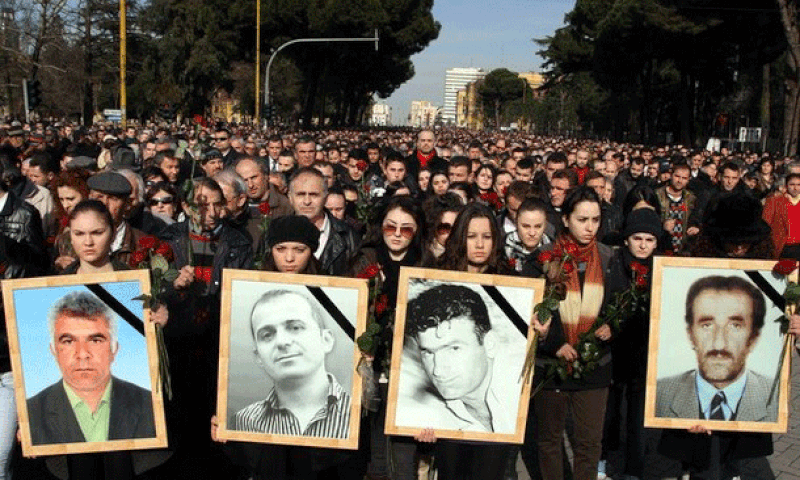On 14th anniversary of 21 January killings Socialist minister of state calls for Berisha to be held accountable

Tuesday marks 14 years since the tragic events of January 21, 2011, when four protesters were killed during an anti-government demonstration in front of the Prime Minister’s Office. Minister of State for Relations with Parliament, Taulant Balla, has publicly called for Prime Minister Sali Berisha to be held accountable as the mastermind behind the killings.
Why is this important: The events of January 21 remain one of Albania’s darkest chapters, with justice still unfulfilled for the deaths of four innocent protestors shot by the Guard of the Republic. While the Guard commander and one guardsman were convicted for their roles, no political figures have been held accountable for ordering the violence. SPAK has repeatedly come under criticism for seemingly dragging its feet on this case and on the Gërdec explosion case where Berisha and his son are alleged to be implicated in the killing of 26 people working in an informal ammunition dismantling factory established with their alleged support.
Context: On January 21, 2011, thousands of protesters gathered in front of the Prime Minister’s Office, demanding accountability from the Berisha-led government for alleged corruption. The protests were caused by the publication of a video recording in which Berisha’s Deputy Prime Minister, former President Ilir Meta discussed bribes in return for energy licenses with one of his party ministers. During the protest, four individuals were fatally shot by members of the Republican Guard. The victims—Aleks Nika, Ziver Veizi, Hekuran Deda, and Faik Myrtaj—became symbols of the fight against government abuses.
Balla recently shared a video on social media showing Republican Guard members firing on protesters, accompanied by inflammatory statements made by Berisha at the time: “There will be five snipers, four on all sides, and I will be in that window, and they will absolutely fire,” Berisha said in a 2011 statement.
While the European Court of Human Rights has urged Albania to fully investigate these killings as state crimes, progress has been limited. SPAK recently reopened the case, which remains unresolved.
Berisha’s response: Asked by journalists whether he would respond positively to a potential SPAK call for an interview on January 21, Sali Berisha went on the attack. He called SPAK a “political institution commanded by Edi Rama,” and referenced a 2011 U.S. government statement, which he claims called for a full investigation “from the police to the organizer.”
Berisha’s remarks follow accusations that SPAK has targeted him politically, with investigations into other cases, including the “Partizani Complex” corruption scandal, in which Berisha is a defendant.
What’s next: The January 21 killings remain a stain on Albania’s democratic history. With the renewed attention brought by SPAK’s investigation and repeated public calls for accountability, pressure is mounting for a thorough and transparent resolution. For the families of the victims, the case represents not only a demand for justice but also a test of Albania’s ability to confront its darkest moments and hold powerful figures accountable.
Berisha vs Balla: In recent weeks Berisha has gone on the offensive against Taulant Balla accusing him of involvement in various alleged criminal enterprises for which he has not presented any evidence. Berisha’s attacks against Balla go back years. When in power, Berisha publicly threatened Balla and his family on a number of occasions because of Balla’s active role in denouncing Berisha’s and Berisha’s family’s alleged crimes. It was Balla that filed the lawsuit on the Partizani complex corrupt privatization that led to Berisha’s indictment and his and his son-in-law’s house arrest.


